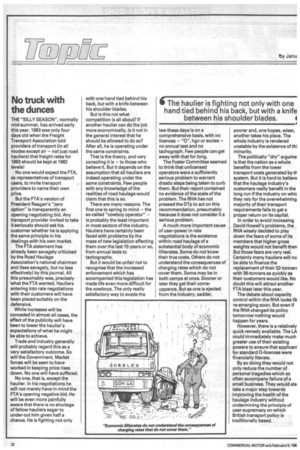• No truck with the dunces
Page 34

If you've noticed an error in this article please click here to report it so we can fix it.
THE "SILLY SEASON", normally mid-summer, has arrived early this year. 1983 was only four days old when the Freight Transport Association told providers of transport (in all modes except air — not just road hauliers) that freight rates for 1983 should be kept at 1982 levels!
No one would expect the FTA, as representatives of transport users, to invite transport providers to name their own price.
But the FTA's version of President Reagan's "zero option" is transparently an opening negotiating bid. Any transport provider invited to take it seriously should ask his customer whether he is applying the same principle in his dealings with his own market.
The FTA statement has already been savagely criticised by the Road Haulage Association's national chairman and (less savagely, but no less effectively) by this journal. All this presumably was, precisely 'what the FTA wanted. Hauliers entering into rate negotiations with their customers will have been placed suitably on the defensive.
While increases will be conceded in almost all cases, the effect of the publicity will have been to lower the haulier's expectations of what he might be able to achieve.
Trade and industry generally will probably regard this as a very satisfactory outcome. So will the Government. Market forces will be seen to have worked in keeping price rises down. No one will have suffered.
No one, that is, except the haulier. In his negotiations he will not merely have in mind the FTA's opening negative bid. He will be even more painfully aware that there is no shortage of fellow hauliers eager to under-cut him given half a chance. He is fighting not only with one hand tied behind his back, but with a knife between his shoulder blades.
But is this not what competition is all about? If another haulier can do the job more economically, is it not in the general interest that he should be allowed to do so? After all, he is operating under the same constraints.
That is the theory, and very consoling it is — to those who believe it. But it depends on the assumption that all hauliers are indeed operating under the same constraints. Few people with any knowledge of the realities of road haulage would claim that this is so.
There are many reasons. The first one to spring to mind the so-called "cowboy operator" — is probably the least important in most sectors of the industry. Hauliers have certainly been faced with problems by the mass of new legislation affecting them over the last 15 years or so, from annual tests to tachographs.
But it would be unfair not to recognise that the increased enforcement which has accompanied this legislation has made life even more difficult for the cowboys. The only really satisfactory way to evade the law these days is on a comprehensive basis, with no licences — "0", hgv or excise — no annual test and no tachograph. Few people can-get away with that for long.
The Foster Committee seemed to think that unlicensed operators were a sufficiently serious problem to warrant drastic steps being taken to curb them. But their report contained no evidence of the scale of the problem. The RHA has not pressed the DTp to act on this recommendation, presumably because it does not consider it a serious problem.
A much more important cause of user-power in rate negotiations is the existence within road haulage of a substantial body of economic illiterates. Some do not know their true costs. Others do not understand the consequences of charging rates which do not cover them. Some may be in both camps at once. Sooner or later they get their comeuppance. But as one is ejected from the industry, sadder, poorer and, one hopes, wiser, another takes his place. The whole industry is rendered unstable by the existence of thi minority.
The politically "dry" argume is that the nation as a whole benefits from the lower transport costs generated by th system. But it is hard to believe that the haulage industry's customers really benefit in the long run if the industry on whic they rely for the overwhelming majority of their transport requirements fails to get a proper return on its capital.
In order to avoid increasing David Howell's problems, the RHA wisely decided to play down the fears of some of its members that higher gross weights would not benefit then But those fears are very real. Certainly many hauliers will no be able to finance the replacement of their 32-tonner: with 38-tonners as quickly as their customers would like. No doubt this will attract another FTA blast later this year.
The debate about capacity control within the RHA looks Ilk re-emerging soon. But even if the RHA changed its policy tomorrow nothing would happen for years.
However, there is a relatively quick remedy available. The LA could immediately make much greater use of their existing powers to ensure that applicani for standard 0-licences were financially literate.
By so doing they would not only reduce the number of personal tragedies which so often accompany failure of a small business. They would els, take a major step towards improving the health of the haulage industry without undermining the principle of user-supremacy on which British transport policy is traditionally based.












































































































